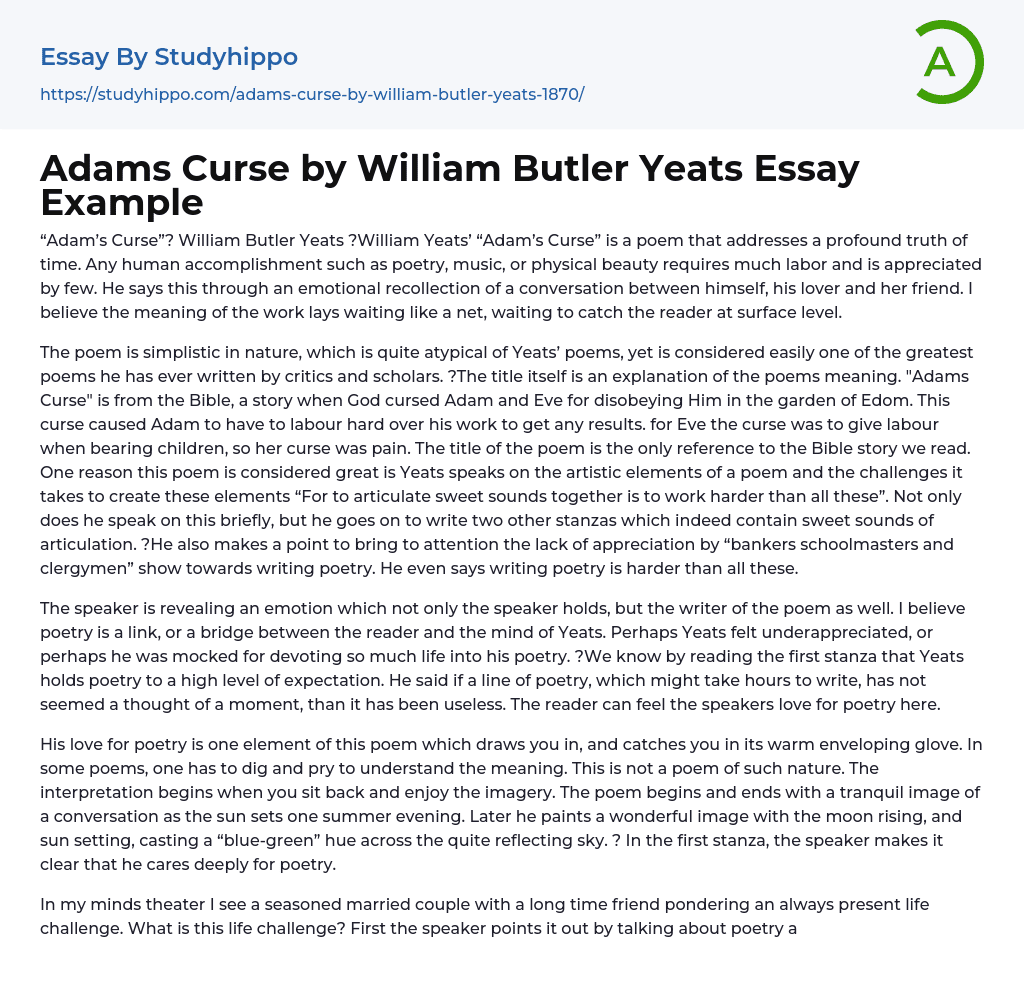"Adam's Curse" by William Butler Yeats delves into the profound impact of time on human endeavors, encompassing poetry, music, and physical beauty. These achievements require substantial dedication and are comprehended only by a chosen few. Through an introspective recollection of a conversation involving the poet, his beloved, and her companion, this sentiment is expressed emotionally. The genuine significance of this poem lies in its capacity to captivate readers' interest and strike a chord within them at a more profound level.
Yeats' poem "Adam's Curse" is distinguished by its simplicity, setting it apart from his other works, yet critics and scholars consider it one of his greatest accomplishments. The title itself alludes to the biblical story where God punishes Adam and Eve for their disobedience in the garden of Edom, cursing Adam with hard work and Eve with painful childbirth.
...Though only the title makes this reference directly, it significantly influences the poem.
One crucial reason why this poem garners such high praise is because Yeats delves into the artistic elements and challenges inherent in creating poetry. He argues that crafting harmonious sounds within a poem requires more effort than any other pursuit. To illustrate this idea further, he dedicates two additional stanzas that eloquently express this notion. Furthermore, Yeats underscores how bankers, schoolmasters, and clergymen fail to recognize the value of poetry. He even boldly asserts that writing poetry is more difficult than all these professions combined.
The speaker and the writer of the poem both share an emotion. Poetry connects the reader with the thoughts of Yeats. Yeats may have felt unappreciated or ridiculed for dedicating so much of his life to poetry. In the first stanza
Yeats expresses his high expectations for poetry. He believes that if a line of poetry, which may take hours to write, does not appear as a fleeting thought, then it is worthless. The reader can perceive the speaker's deep affection for poetry in this passage.
The poem captivates readers with the poet's love for poetry and its warm embrace. Unlike complex poems that require effort to decipher, this poem invites interpretation through its vivid imagery. It starts and finishes with a serene scene of a conversation during a summer sunset. Furthermore, the poet creates a mesmerizing picture of the moon rising and the sun setting, coloring the calm sky with a soothing "blue-green" hue. The opening stanza strongly conveys the speaker's profound affection for poetry.
The text presents a conversation between a married couple and their friend, discussing the challenges of life. Initially, the speaker reflects on the difficulties and lack of recognition faced by poetry. Subsequently, the partner's friend contributes to the discussion by highlighting the obstacles associated with physical beauty, emphasizing that it requires diligent effort to attain. Expanding on this notion, Yeats references Adam and Eve's tale in Genesis, asserting that since Adam's fall, all things of beauty necessitate significant exertion. Despite being composed a century ago, this message remains relevant today.
It is evident that the speaker deeply loves and appreciates the individual being addressed. His words not only convey his affection for his partner but also his fervor for poetry. Throughout the poem, he contemplates poetry alongside his beloved and exhibits compassion towards them in its concluding lines.
The speaker expresses that they have experienced a fulfilling and long existence alongside a woman whom
they consider to be genuinely captivating. They possess an extraordinary comprehension and admiration, which is quite rare. The speaker acknowledges their earnest endeavors in loving the woman in a conventional way. In the concluding verse, as the speaker contemplates love, silence descends upon the audience. This perhaps signifies the speaker's emphasis on the unparalleled significance of love, seen as humanity's most remarkable attribute. Comparing the moon to our hearts, the speaker describes it as "worn as if it had been a shell washed by time’s waters".
Although it is evident that he adores his lover and has been content in their relationship, the impact of Adam's fall will eventually make even the bond of love grow weary. In the concluding line, he describes their love as "weary-hearted as that hollow moon". The essence of this poem is that we are all bound by the curse of Adam. Yeats ventures into a profound philosophical concept, presenting it in a beautiful manner. Perhaps, Yeats desired for the reader to simply acknowledge the troubles he discussed, hoping to stimulate their thinking with a fresh perspective. I believe the poem served as a means for Yeats himself to express his own fatigued heart.
- Book Summary essays
- Metaphor essays
- Reader essays
- Rhyme essays
- Literary devices essays
- Villain essays
- Books essays
- Genre essays
- Literary Criticism essays
- Writer essays
- Protagonist essays
- Simile essays
- Poem essays
- Book Report essays
- Book Review essays
- Greek Mythology essays
- Plot essays
- Tragic Hero essays
- Coming of Age essays
- Play essays
- Rhetoric essays
- Rhetorical Question essays
- Translation essays
- Understanding essays
- Reason essays
- Character essays
- Letter essays
- American Literature essays
- Literature Review essays
- Utopia essays
- Poetry Analysis essays
- Dante's Inferno essays
- Between The World and Me essays
- Incidents in The Life of a Slave Girl essays
- Flowers for Algernon essays
- Myth essays
- Everyday Use essays
- Boo Radley essays
- Genesis essays
- Richard iii essays
- Alice in Wonderland essays
- On the road essays
- Ozymandias essays
- The Nightingale essays
- Holden Caulfield essays
- Animal Farm essays
- 1984 essays
- A Hanging essays
- Shooting An Elephant essays
- A Tale Of Two Cities essays




